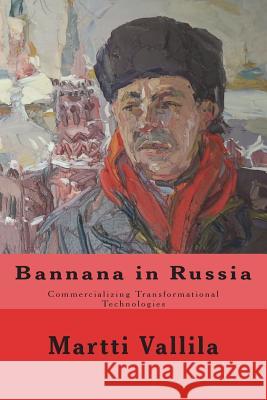Bannana in Russia: Commercializing Transformational Technologies » książka
Bannana in Russia: Commercializing Transformational Technologies
ISBN-13: 9781484817759 / Angielski / Miękka / 2013 / 404 str.
Russia is the last untapped source of potentially disruptive technologies. Its history as a closed, alternate society, in the days of the Cold War, fed an insular culture. Soviet science proved its capabilities dramatically with the launch of sputnik. Sakharov developed an original design for a Hydrogen bomb. The alternate universe no longer exists. The world is connecting, thanks to a web whose commercial origins can be traced to Silicon Valley. The "Valley" is on the lookout for the next "big thing." Where might it come from? Consider Russia. Many clever Russians left in the 90's, and can today be found throughout the world solving the most complex technical problems for companies like Intel and Google. When Russia first opened in 1991 the only alternative available to Russians interested in launching their ideas into the global village was to immigrate. Many did. Today other options exhist, thanks to the Internet and world wide web. Transformational technologies often emerge from new perspectives. There are probably more untapped "new perspectives" hidden in Russia then anywhere else. Why? A combination of two facts: (1) Russians have access to the world's technologies thanks to the West's openness. They are up to date. (2) Russians do not trust their government to protect their interests, and thus keep brilliant ideas to themselves. Soviet society did not recognize private property. Intellectual Property protection is fundamental to value creation and innovation. The Russian government speaks about the need to modernize, to advance beyond its historic reliance on raw materials to fuel its economy. Skolkovo, Russia's attempt to duplicate Silicon Valley in a park near Moscow, suffers from an unspoken truth: it is not trusted by those with trully brilliant ideas. I first visited Russia in 1991, just as she was opening. I was struck by the unharnessed energy of her people. My background, born in Prague, son of a Finnish diplomat who participated in the negotiation of post-war reparation agreements between Finland and Russia, gave me a unigue perspective on what is possible. The book tells the story of how this perspective was educated in the world of "hard knocks." When I left IBM on my "leap of faith" I did not know what I was doing, other than following what I believed to be a calling. Experiences described in the book have forged a business model that I believe addresses historical challenges and opportuniteis. Key points: Russians with potentially "transformational technologies" MUST protect them in the west, where the action is. They MUST then work with TRUSTED foreign PARTNERS to bring their ideas to life. The book tells the story of how I started my consulting business, Virtual Pro, and then founded companies based on "transformational technologies" I stumbled on. One offers a promising treatment for Alzheimer's (Buddha Biopharma). Another promises an extension of Moore's Law on silicon (Fuzzy Chip). These are not small ideas. Getting them launched has not been easy. My original idea about Finland as a "gateway" out has been discouraged by events described. Singapore has emerged as my location of choice, a "safe haven" with respect to IP protection, the "rule of law," without a Russia "complex." I take the reader to the far corners of the largest country on earth, during the period in which it experienced great change. Chapters describe many locations, and technologies I have discovered there. I have made nothing up. It is my hope that the story will plant fertile seeds and play a role in developing an image of Russia as a source of the next ""big thing." And educate Russians with big ideas on how to launch them successfully. I takes the reader through steps needed to build any business, specifying relevant "bussiness lessons" at the conclusion of every chapter. The book may be useful as a teaching tool, as a provider of "case studies," presented with humor.
Zawartość książki może nie spełniać oczekiwań – reklamacje nie obejmują treści, która mogła nie być redakcyjnie ani merytorycznie opracowana.











